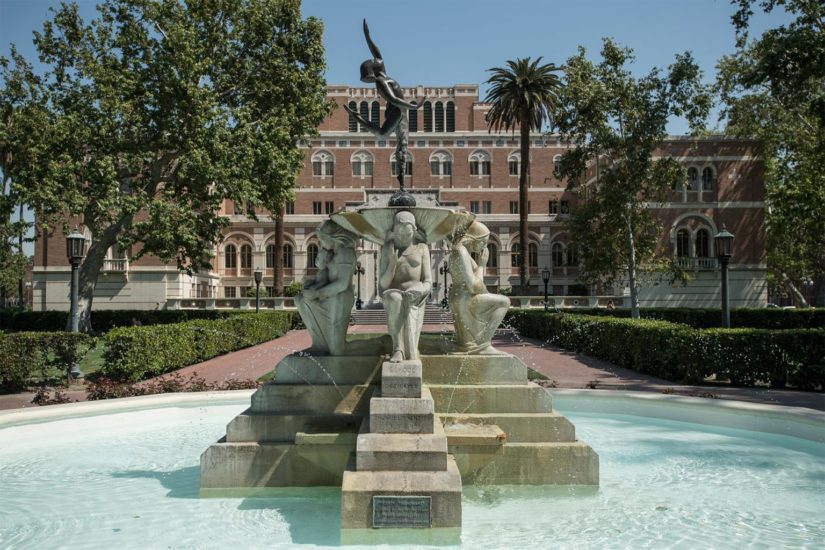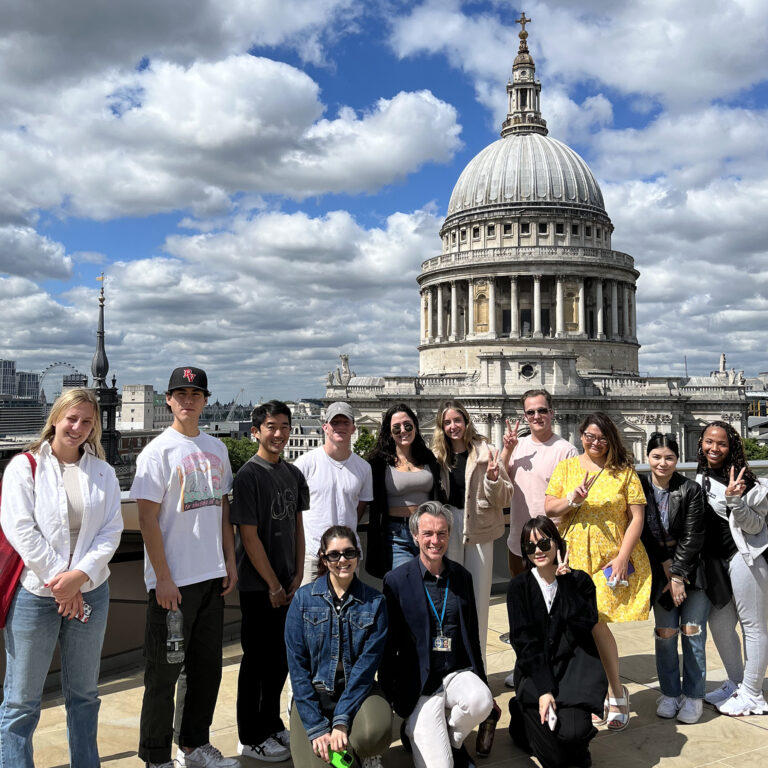
“Youth Triumphant” in Alumni Park is a landmark on the USC University Park Campus. (Photo/Peter Howard)
USC reaccredited after inclusive review of university standards, curriculum, quality and culture
USC was reaccredited for 10 years after inclusive review of university standards, curriculum, quality & culture.
In a reaffirmation of academic excellence and positive change, the Western Association of Schools and Colleges’ Senior College and University Commission (WSCUC) announced that USC has been reaccredited for 10 years, the longest term possible.Accreditation is an endorsement of a university’s educational standards. It validates credits and degrees issued by the institution and allows USC students access to federal financial aid and other sources of public funding.
USC President Carol L. Folt received confirmation of reaccreditation in a letter Tuesday.
“The assessment team confirmed USC’s longstanding position as a leading research university that is advancing knowledge and society in one of the most dynamic and vibrant cities in the world,” Folt said. “I want to thank Provost Charles Zukoski and the many people who helped guide USC through the review process, which was made that much more challenging due to the pandemic. It is an excellent result.”
The assessment team also commended the university’s focus on academic excellence, entrepreneurship and innovation, interdisciplinary research and teaching, and global engagement.
In addition, the committee highlighted that, despite the pandemic and past ethical and legal challenges, the USC community is working collaboratively to strengthen shared values, embrace inclusivity and expand access.
Zukoski, one of Folt’s first senior leadership appointments, sees the reaccreditation report as documentation of USC’s progress toward greater convergence of ideas, knowledge and interests across academic disciplines in a time of rapid evolution in higher education.
“This is a testament to the quality and strength of USC’s academic programs, faculty, researchers and students,” Zukoski said. “I’m very proud that our university’s commitment to excellence was recognized, along with our shared commitment to the Culture Journey that engages all of us.”
The commission praised the university’s new leadership team — the most diverse in USC history — for its ongoing commitment to positive change. Convergence in interdisciplinary study and program development along with a universitywide spirit of inclusiveness were also noted as key elements of USC’s advancement.
USC accreditation: a mammoth homework assignment
Reaccreditation, a rigorous but rewarding process that occurs every 6-10 years, is a review of leadership, curriculum, quality and mission along with other aspects that define the university. It begins with self-study on the university’s part, requires a trove of supporting documentation and culminates with a site visit by the reaccreditation visit team made up of five academic leaders from other peer institutions. An Accreditation Steering Committee, co-chaired by Professors Tracy Tambascia and Andrew McConnell Stott, took on the challenge of charting a path forward.
In addition to their faculty roles, Tambascia is president of the USC Academic Senate and a member of the WSCUC Commission, and Stott serves as USC’s new vice provost for academic programs and dean of the Graduate School.
Reaccreditation requires a multiyear mobilization of university resources from all schools to produce an institutional report that — with all elements included — totaled 1,500 pages. Evidence of compliance with as many as 50 accreditation requirements and federal regulations must be cataloged. There are data exhibits, federal compliance forms and appendices that need careful coordination between academic units. Sections of the self-study are co-written by groups of committee members and Robin Romans, associate vice provost for academic affairs, who hunkered down with a laptop and a phone in the depths of the pandemic to pull together several threads.
“The challenge is keeping it all moving forward,” Romans said. “As you immerse yourself in one element, you almost immediately begin to worry you’re forgetting another. And then, of course, you’re thinking ahead to the next stages. I try to keep a short horizon for myself and the accreditation committee — things we can accomplish and move on from. As you chip away, you begin to see you’re making progress.”
That progress reached a high-water mark in the first part of this year, when 15 panels were organized to offer answers and insights to the reaccreditation visit team during its virtual site visit at the beginning of March. Faculty, staff, students, vice presidents, deans, vice provosts and 11 trustees supported the process and participated on panels.
“We knew our panelists would be thoughtful and would not always agree, which is exactly what should happen at a university,” Romans said. “Critical engagement is what moves us forward, and we were sure that the visit team would welcome that.”
The reaccreditation team was chaired by Stanford University Provost Persis Drell and included New York University Senior Vice President Lisa Coleman; Earl Lewis, University of Michigan distinguished professor and former provost at Emory University; Dean Robert Jacobsen of the University of California, Berkeley; and Indiana University researcher Jillian Kinzie, who served as assistant chair.
The report cited “significant growth and dramatic change” at USC over the past decade. The report repeatedly credited the university’s Culture Journey for strengthening values across the institution and noted the university community’s commitment to continuing that work.
Reshaping of university culture cited in USC accreditation
The university began its journey to strengthen university culture last year as part of a commitment to change announced in 2018 amid unprecedented and well-publicized ethical and legal issues.
The initiative complements a series of seminal changes that began when Folt was named the university’s president in 2019. Folt acted quickly to address critical challenges and committed to increase diversity, affordability, sustainability, research and community partnerships. Those partnerships, including longstanding relationships and emerging opportunities, were acclaimed by the commission.
A values poll conducted in the fall of 2019 drew participation from 20,000 students, faculty and staff. Together those groups created a new vision for change and identified key shared values of excellence, integrity, accountability, diversity, well-being and open communication. The infusion of those shared values in day-to-day interactions was singled out for commendation in the commission’s report.
After results were announced, a series of conversations about university culture included town hall meetings and discussions last year. The ongoing Culture Journey is shaping the student experience, curriculum and systems.
Foundational changemakers include Felicia Washington, USC’s first senior vice president of human resources, and Christopher Manning, inaugural chief inclusion and diversity officer.
Stronger reporting procedures, a restructuring of the Board of Trustees designed to ensure greater oversight, and fundamental changes to the student health system were noted in the visit team’s report.
The appointments of Stacy Giwa as vice president of ethics and compliance, Mike Bohn as director of athletics, Winston Crisp as vice president for student affairs, Steven Shapiro as first USC senior vice president for health affairs as well as the creation of the Office of the Ombuds and the Office for Equity, Equal Opportunity and Title IX, all fueled momentum toward a new and diverse university culture that received high marks.
Inclusivity in real terms for the college-bound
Affordability, a university pillar highlighted in the reaccreditation report, received a significant boost in 2020 when Folt launched an initiative to expand accessibility for middle- and low-income students. The initiative made tuition free for students whose families earn $80,000 or less annually and applies to first-year students who enrolled in the fall of 2020. Future first-year students will also benefit.
Last fall’s freshman class included more first-generation students than ever before, a group better served by the establishment of the First Generation Plus Success Center, a service center that also supports undocumented, transfer and former foster youth students.
USC accreditation notes university size is a strength and a challenge
The reaccreditation process includes follow-up and assessment of progress. It helped identify faculty concerns about transparency, uncertainty and the “change fatigue” that set in after a time of rapid transformation. Recommendations include targeted outreach to faculty who have expressed concerns and a clear definition of roles and responsibilities in shared governance.
The report also recommended the university develop technology systems to support advisement and inclusion and to keep students graduating on time.
The report called USC’s size and complexity both a strength and a challenge, a view addressed more widely by Folt in her State of the University address in April:
“Clearly, we have the talent, the location, the bandwidth, and the resources to make a unique mark on the world.”
